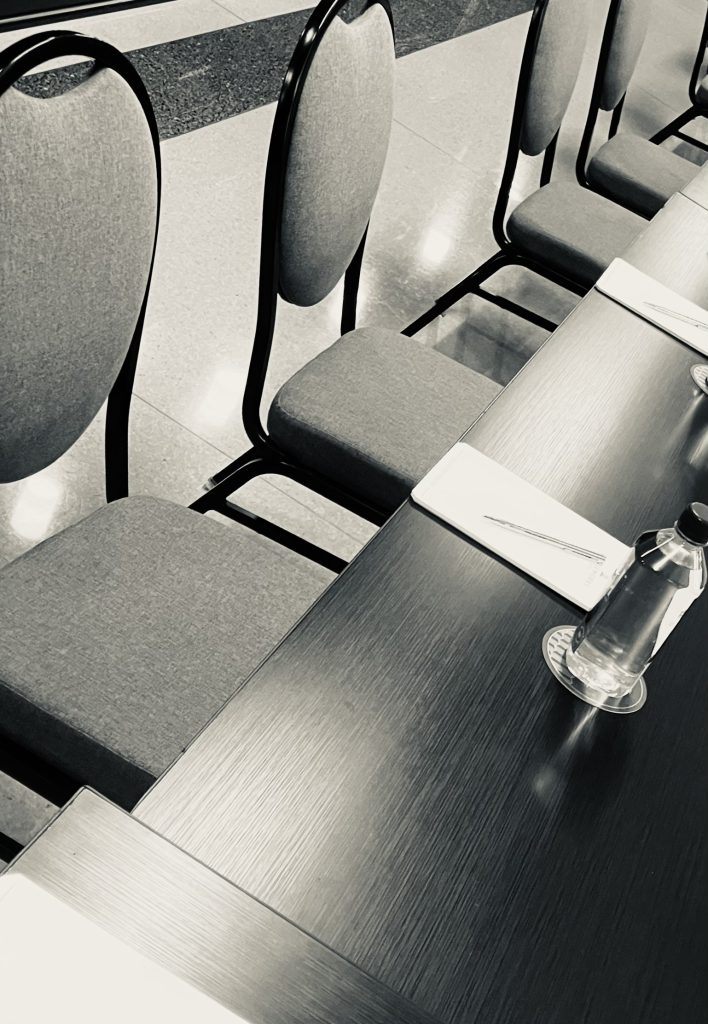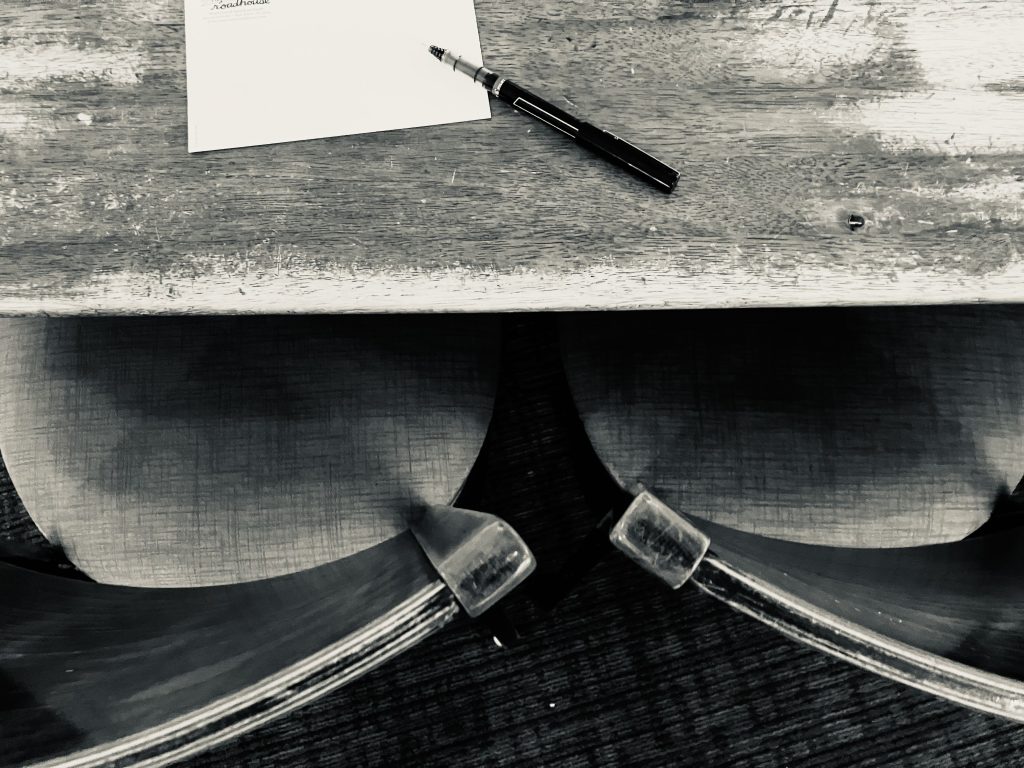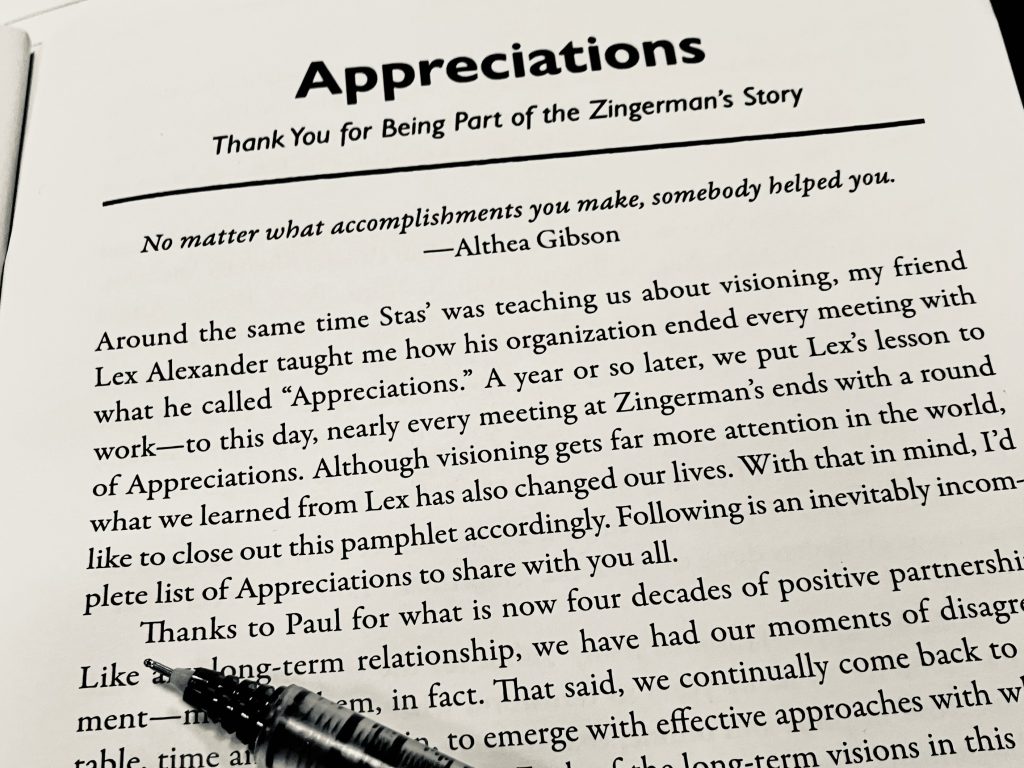Effective Meetings Help Make Healthier Organizations

Well-run, inclusive meetings offer a constructive act of resistance
This Thursday morning, from nine to noon, I’ll join about 80 coworkers for our monthly Zingerman’s Community of Businesses (ZCoB) huddle in the ZingTrain conference room. While a three-hour meeting might sound off-putting to many, I genuinely look forward to it. For me, the huddle is theologian Richard Rohr’s statement—“The best criticism of the bad is the practice of the better”—put into real-life action. It is tangible evidence that people of different ages, backgrounds, job descriptions, levels of authority, and daily responsibilities can consistently gather to demonstrate what anarchist anthropologist David Graeber called “our capacity to come together as reasonable human beings and work out the resulting common problems.” In its own imperfect way, the huddle is a down-to-earth application of democratic practice, demonstrating, as Graeber writes, that each of us can quietly be “people who can make a difference in world events.”
To be clear, multi-hour-long meetings were not always events I was eager to attend. Like many folks who start small businesses, I spent years caught up in my distaste for the idea—and the reality—of spending much time in meetings. Start-ups, after all, are about action. New businesses—especially those fortunate enough to be busy from the get-go, as we were with the Deli—don’t offer much opportunity for sitting around the table talking. As I would have said at the time, not entirely inaccurately, we had much more “important” work to do.
That was then, but it is not, as you can already tell, now. As I explain in The Power of Beliefs in Business, negative beliefs of the sort I once held will always lead to negative outcomes. Great organizations, great lives—great anything—I now know, cannot be built on negative beliefs. I’m happy to say I have successfully changed my mind. Today, in 2025, I have a whole host of positive beliefs about what well-run meetings can make possible. Over the years, it has become eminently clear to me that effective, inclusive, collaborative meeting management—as we work hard to practice here in the ZCoB—is:
- An essential ingredient of running any organization and, more broadly, a cornerstone of healthy democratic constructs.
- A quiet but powerful form of positive resistance—when autocracy is on the rise, open, dignity-centered meetings counter the arbitrariness of behind-closed-doors autocratic rule and help to lay the foundation for healthier societies.
This last part, especially, is something I’ve only recently come to understand. Others, though, have seen it clearly for years. Journalist David Frum said it succinctly in 2017:
Democracy … is about meetings.
Years ago, I would have taken Frum’s statement in the context of what gets done in Congress. Today, I view it from a quite different perspective. Most of the meetings that make up the democracy David Frum is describing actually begin, not in Washington, but rather with what you and I do at work every day. In a country full of inclusive, dignity-based, effective meetings, Congressional hearings would look and sound far more constructive than they do currently. As my business partner of four-plus decades, Paul Saginaw, always says, one can learn to “disagree without being disagreeable.”
In this sense, our ZCoB-wide Thursday morning meeting is a small but meaningful contribution to making this an effectively operating, inclusively democratic country. Jason Stanley, professor at the University of Toronto and author of How Fascism Works, recently wrote me,
Workplace democracy is one of the central and most important topics in democratic political philosophy. It’s where the battle over authoritarianism is fought. … Democracy takes work.
In the free, “non-state,” democratic space of Kurdish Rojava (in Northern Syria), there is a widely repeated Kurdish expression: “Resistance is Life.” Which means that one way to resist, in troubled times when autocracy is on the rise, is to continue to live life in constructive, collaborative, inclusive, and effective ways—rather than slide into the sort of defensive reactivity and passive disengagement that dictators dream of. In Rojava, meetings akin to the one we will have on Thursday morning are also the norm. Writing about the Kurds’ work there, journalist Harry Waveney observed, “The most precious thing they have offered us is the truth that things can be different” from the way they are in most countries. That is very much my hope for our organization, too—that we show, despite the seemingly monolithic mainstream you see in most business news, that business really can be done differently.
A seemingly small but significant part of what makes our work work in the Zingerman’s Community of Businesses is that we long ago learned to value what it takes to run a good meeting. When experts talk about why the ZCoB works as it does, they usually point to stuff like high-quality products, great customer service, memorable marketing, or maybe even Servant Leadership or Visioning. Good meeting management almost never makes the list!
The reality is that the hard work it takes to prepare and run a meeting is now so deeply embedded in our culture that casual observers barely notice it. Here, though, we don’t take it for granted. Leading and participating in well-run meetings are skills people learn through both formal systems and informal practice. I don’t think it’s an exaggeration to say that most folks who’ve been here five or six months—and have chosen to actively engage in our work (I know not everyone does)—can step into a range of meeting roles and, on the spot, start to do a solid job. They’re also well accustomed to being effective participants. And when we mess up, that shared skill set usually helps us quickly see where we went astray.
Much of the world, I know, skips right past this stuff. Photographer Tomasz Trzebiatowski, the founder of Frames, gave me a good way to understand the situation through the lens of photography. The work the public pays attention to—like reubens and rye bread, food tours and fried tofu—is centered in the light. But, as Trzebiatowski points out, light only makes sense in relation to what we usually miss: the shadows that give it shape and meaning:
We always say photography is about light, but maybe it’s really about shadows. … Light is obvious, right? It illuminates. It reveals. But without shadow, light is just brightness, flat, directionless, empty. Every photograph you have ever loved has shadows in it.
They shape the scene. They carve out the space. They give depth, drama, and tension. … Shadows are not the absence of light. They are the evidence that light has form, direction, and meaning.
So … don’t just chase the light. Listen for the shadows because they are the ones that make the photograph speak.
Well-run meetings, in this context, happen in the shadows of organizational life—they’re the behind-the-scenes infrastructure that’s essential but almost invisible to the average consumer. They aren’t actually hard to see; it’s just that hardly anyone looks. Most people are understandably drawn to the light—great products, profit-and-loss statements, inspiring speeches by bosses. But off to the side, in the organizational equivalent of the shadows, it’s the imperfect but consistent effectiveness of our meetings that makes everything else possible. The public takes no notice, but I know the reality: no good meetings, no pastrami, no profit, no people!
It is my strong belief that anyone who is a part of an organization that aspires to excellence would be wise to master good meeting skills. And, if people want to be part of a democratic construct—either at work or in the world around them—they, too, will need to learn them. Democracy, it turns out, doesn’t turn on what happens in Congress; to the contrary, it’s about how we run our Student Council when we’re in grade school. And as David Frum says, “The Parent-Teacher Association (PTA) … is the incubator of democracy.” What we do in our workplaces makes a difference in the world. All of which means that if we want an inclusive society, dedicated to due process and dignity, well-run business meetings are a really good place to begin.
Recent evidence for this fact of organizational life is coming in abundance right now from a fairly unlikely spot: Serbia. The student-led meetings and the pro-democracy demonstrations that emerge from them are remarkable. Of this grassroots work the Serbs are doing, historian Timothy Snyder wrote this past weekend, “Those who care about the future of democracy should know about them.”
The story in Serbia started last November, when the concrete canopy of the main railway station in Novi Sad, the country’s second largest city, collapsed onto the busy pavement below, killing 16 people and severely injuring another. In the aftermath, local students gathered to protest, demanding accountability and safer public infrastructure. Those first early acts of resistance have evolved into a mass movement actively advocating for the end of autocratic rule and the reinstatement of democratic norms and due process in the country. They have been doing this work, impressively and very effectively, for over 10 months now.
Unfortunately, the Serbian government has often responded to these peaceful demonstrations with violence and provocation. In a panel discussion held in Brno in the Czech Republic last spring, one Serb student caught my attention when she commented on the government’s actions,
Something really scary, really terrifying happened in our country.
While the situation here in the U.S. is not the same as in Serbia, I can still relate to what she says. Scary and strange things seem to be happening here in our country almost every day. In that sense, we are all faced with the same situation the students in Serbia were—we can stand aside, or we can find peaceful, positive ways to stand up and be seen.
How can we do that? Good meetings aren’t glamorous, but they are a good way to stick to our principles. Timothy Snyder recently urged, “Resistance requires an openness to learning from others.” While we seem to be unsure of what to do, the student-led movement in Serbia has organized itself by running hundreds of regular open meetings—what they call plenums—in which inclusion and consensus are very much the norm. Instead of becoming more militant in response to autocratic attacks, they have put their energies into holding remarkable meetings.
Who knew? Running good meetings can be seen as an act of meaningful resistance. In early June, the Serb Student u svakom selu (“A student in every village”) program posted a message on its Instagram that we could all take to heart: “Ask yourself a question—Who is ‘building’ your future? So exercise your right, be a part of the change!”
There’s a lot to be said for the impact of their approach. The journal Balkan Insight titled a long article about the movement: “Serbia’s Student Plenums: A Blueprint for Renewing Democracy.” In April, Serbian sociologist at the University of Belgrade, Suzana Ignjatović, wrote about the students’ good work: “Through plenums and public gatherings, people involved in Serbia’s protest movement are trying to reclaim public institutions.” The impact has far exceeded what most observers might have imagined. Plenums, she points out,
… are not just a technical tool, but the ideological pillar of the student movement. In the manual for plenums, students encourage people to organise zborovi, or public gatherings, as “plenums for citizens,” and even offer training. In this sense, direct democracy has been rediscovered as a long-forgotten political method. … All important decisions are made in plenums, including on strategy going forward. … A plenum-type gathering is a first-aid kit for patchwork democracy, rooted in the belief that political change from below is possible.
Learning to run effective, inclusive, equitable meetings helps you, and it helps the people you work with. It helps your organization to function far more effectively. And learning to be an effective participant in those meetings is, I have learned, a prerequisite for being a good long-term citizen. When we do it well, the world around us is made better in the process. Artist and head of Black Mountain College for many years, Josef Albers—who escaped from Germany in the years before the Nazis took power—wrote,
To distribute material possessions
Is to divide them
to distribute spiritual possessions
is to multiply them
This multiplication is what is happening in well-run meetings in healthy organizations. Everyone involved comes out ahead. People do productive work and learn how to be active, constructive citizens at the same time.
What the Serbs are doing is parallel, in a positive way, to what is happening in the Kurdish communities of Northern Syria. In the above-mentioned article entitled “Resistance is Life” in the journal Planet, Welsh writer Harry Waveney describes the Kurdish concept of hevaltî. One Kurdish friend here called it “comradeship.” Waveney compares it to the idea of peer-to-peer friendship and support. Hevaltî, not competition and conflict, is what the Kurdish resistance movement is organized around. Like the plenums in Serbia, the Kurds have woven effective, equity-based meeting management into the way they work. It is how they run their lives. Author Janet Biehl, who has written a number of books about Rojava, says, “There are many meetings, of course. … it’s a very communal society, a very communitarian society, so it’s part and parcel of their life.” This is pretty much how I would describe life in the ZCoB as well.
Through these meetings, the Kurds in Rojava are changing lives and running their country. Waveney writes,
The Rojava revolution is hevaltî generalised, and it is not limited to the borders of Northeast Syria. It exists within those who fight for it, worldwide. It is friendship rendered at the level of politics.
These are not mere romantic affectations but how the Kurds and their allies will often describe their achievements, and the key to their success. Their goal is nothing less than the total transformation of life. … The Rojava revolution gives ordinary people the freedom and power to say, I am here.
Showing up to participate in the day-to-day governance of their communities—or in our case, our company—makes a huge difference. It is an entrée to dignity, an act of active inclusion in all directions, a way to learn to participate and to own one’s own power.
This work of effective meeting management is not as easy to do well as cynics on the outside might imagine. Running good meetings is hard work, but it’s good work. And it demonstrates in a down-to-earth, wonderfully humble way that no matter what happens around us, we are here doing good, inclusive work every day. It makes real what Kurds in Rojava say regularly: “We’re here because we’re here because we’re here because we’re here.” Good meetings aren’t magic. As Kurdish sociologist Dilar Dirik writes, we do them, “Not because these things are perfect, but because things are possible—through faith and struggle.”
Anarchist Howard Ehrlich writes, “If we are not actively involved in building the new society today, it is unlikely that we will be involved tomorrow.” In the context of which, inclusive, well-run meetings show—on a small scale—what is possible. They invite and organize the kind of constructive conversation that is critical to this work. And they make happen what Ehrlich is advocating: “The goal of organizing ourselves collectively is to empower each and every member of the collective.” Thursday’s meeting is open to anyone who works in the ZCoB. And, even if they’ve only worked with us for a couple of weeks, we pay them to come and participate.
If you think what you do at work won’t make much difference, take note that what started as small student gatherings in Serbia is now a mass movement. In March, over half a million people marched together, peacefully, in the capital city of Belgrade. Essentially, the way the students in Serbia are bringing democratic practice to their day-to-day decision-making is changing the culture of the country. The practice of the plenum is spreading. As Timothy Snyder writes, “Serbs did not have to be students to understand the students. And the students gave them something to understand.”
In only 10 months, the impact has been significant in ways I don’t think anyone would have imagined a year ago at this time. The Serbian sociologist Suzana Ignjatović says,
Plenums have become popular across Serbian society—among schoolteachers, parents of schoolchildren, public libraries, university professors, and local communities. Everyone has been encouraged by students to exercise direct democracy. … Almost every public protest can turn into a plenum about some issue.
When all is said and done, if we want to have democratic constructs—in companies or countries—it is imperative that we learn how to run a good meeting. Susan Griffin, writing in Wrestling with the Angel of Democracy, says, “It is perhaps what democracy is in the end: a meeting.” Running meetings is not what most people go into business to do, but it is what anyone who wants their business to run well—and to model what’s possible in the most positive way—needs to learn.
In 1965, the Students for a Democratic Society, which was founded here in Ann Arbor five years earlier, put out a photocopied pamphlet called A Movement of Many Voices, written “for those who wish to devote themselves to organizing activity for a summer or longer.” In it, they remind us that, “Movements begin when people get together to think out loud about the kind of city they might help create.” One person in the piece came up with a quip that has had me smiling for days:
Freedom is an endless meeting.
Democratic engagement of diverse voices—here in the ZCoB or anywhere—can only happen if there is a near-constant conversation. Done well, it’s remarkably effective: different perspectives are processed with dignity, clear decisions are made, meaningful notes taken, plans shaped, and business gets done. Done poorly … you don’t need me to tell you—it’s a mess.
Learning to do this work is not something that’s just for a handful of leaders. To the contrary, knowing what I know now, I wish we had learned it when we were little kids in school. After all, if we can’t get together and converse constructively, make meaningful decisions, and get moving in an agreed-upon direction, things—quite simply—won’t work. As Nigerian author and poet Chinua Achebe once wrote, “A functioning, robust democracy requires a healthy, educated, participatory followership, and an educated, morally grounded leadership.” The same holds true in organizations: if we don’t actively teach people how to participate in governance, what they learn—or don’t learn—will make a huge difference.
In an era in which civics classes have been just another victim of budget cuts and focus on science and math, many people have nowhere in which they can learn these critical community-building skills. The good news, organizations like ours can do it, right now!
John Tropman, University of Michigan professor of Social Work, writes in Fixing Broken Meetings, “Decisions are the lifeblood of organizational jobs, tasks, and work. … [and] there is a deeper structure to decision making than most people appreciate.” That structure is what learning to run good meetings makes possible.
Next week, I will share a lot more about the basics of how we run meetings—as I’ve said, it’s not all that glamorous, but it’s something no organization, of any size, should work without. Their impact on our work, as you can tell from all of that I’ve written here, has been enormous. Sticking to our inclusive, dignity-centric practices of gathering consistently and constructively is an act of quiet but meaningful resistance. The news is all over the place, but we are still right here, getting together and doing our work as we have done for many years now. As the Kurds in Rojava say, “We’re here because we’re here because we’re here because we’re here.”
In his terrific small book, On Tyranny, Timothy Snyder’s second lesson for those who want to resist the imposition of authoritarian rule is “Defend institutions.” He says,
It is institutions that help us to preserve decency. They need our help as well. Do not speak of “our institutions” unless you make them yours by acting on their behalf. Institutions do not protect themselves. They fall one after the other unless each is defended from the beginning. So choose an institution you care about—a court, a newspaper, a law, a labor union—and take its side.
Continuing to run good meetings, as Thursday morning’s ZCoB-wide gathering at ZingTrain will surely be, is our effort to defend our own institution. Many companies have made clear that they did not really mean it when they posted their “principles” online. We, I believe, are quietly working hard to stick to ours. And lo and behold, I now see, well-run meetings are actually at the center of that work.
I would never have imagined 43 years ago that we would be known here at Zingerman’s for the quality and effectiveness of our meetings—imperfect but nevertheless important models of what some form of democratic engagement can look like in practice. When they write our history, it may certainly say that we had a great corned beef sandwich, we could bake some delicious bread, and that we were deeply dedicated to both customer service and community. It would make me smile if some history student half a century into the future added in at least a footnote: “They ran some darned good meetings.”
P.S. Next month, on Wednesday, October 15, and Thursday, October 16, I’ll be co-leading the Zingerman’s Experience Seminar with ZingTrain managing partner Katie Frank. It is, I believe, one of the best ways to understand what makes the culture here in the ZCoB unique—to see what, in the words of photographer Tomasz Trzebiatowski, is in the “light” of organizational life as well as what usually remains in the “shadows,” only for insiders to experience. Lots of great learning—and plenty of delicious food to boot!



